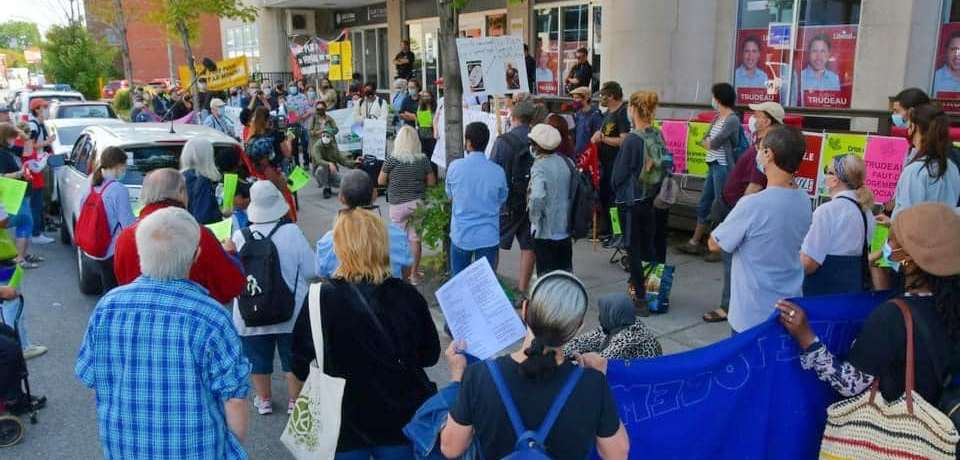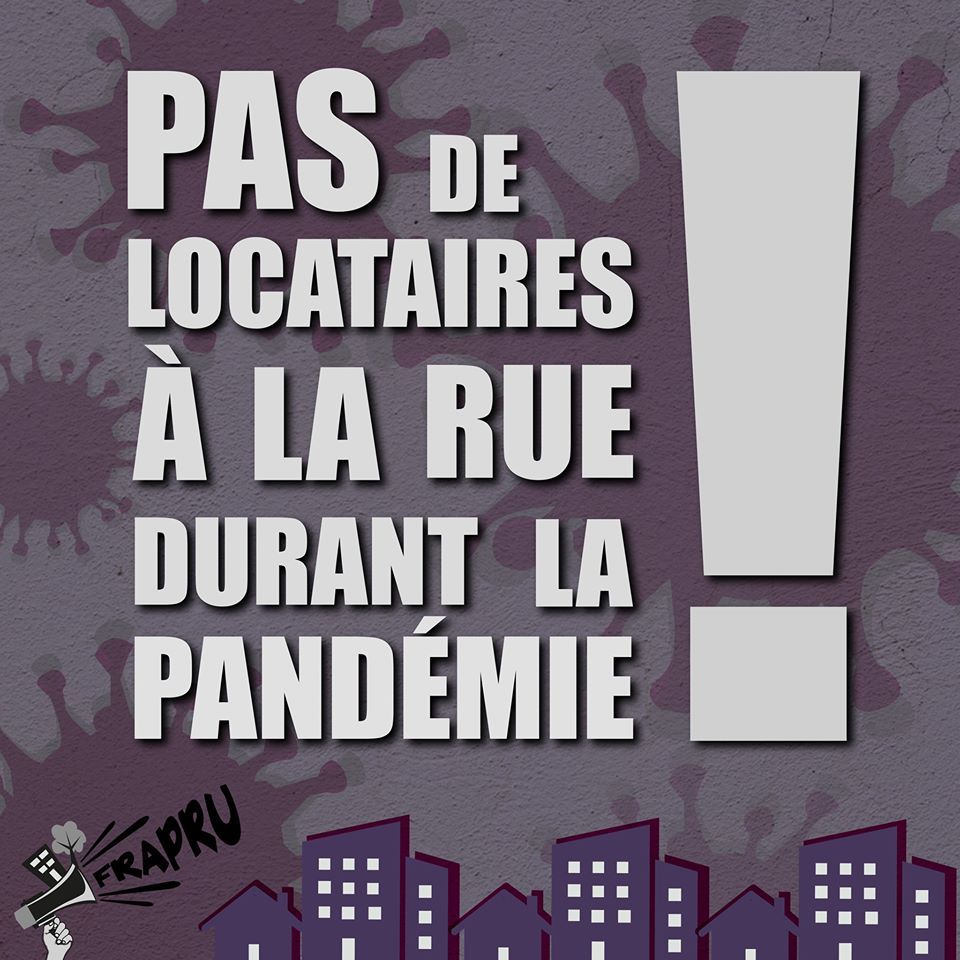Interview
Governments Must Implement Demands Put Forward by Organizations Defending the Right to Housing
– Serge Lachapelle –

Demonstration by housing activists outside Prime Minister Trudeau’s campaign headquarters,
September 14, 2021
The following interview was conducted with housing activist Serge Lachapelle, an MLPC spokesperson on the right to housing and candidate in Laurier–Sainte-Marie.
Renewal Update: During this election the right to housing has been a serious issue in Montreal. Despite this, the cartel parties and media do not have those affected by this problem or with expert knowledge such as yourself speaking about the needs and solutions. Can you comment on this please.
Serge Lachapelle: It is inspiring to see that the organizations that defend the right to housing are speaking in their own name during this election campaign and rejecting the call to put the issue of housing rights back in the hands of cartel parties. The hypocrisy of the cartel parties is beyond the pale.
Of the two parties that are said to be the main contenders to win the election, the Liberals have said that they will take action on the problem of evictions of tenants under the hoax of renovations although the matter is under provincial jurisdiction. Justin Trudeau also said that he is going to deal with the social housing issue but he didn’t say anything concrete, just more words devoid of concrete action. In addition, he said that the way out of the crisis will be through private home ownership. Activists responded by saying this is an affront to tenants who are at risk of being put out onto the street because they cannot afford private home ownership by buying a house or a condo.
As far as the Conservatives are concerned, their main demand in terms of housing is tax benefits for those who already own houses to make them more affordable. Their platform is also in the service of narrow private interests.
We must also remember that the federal government, in 1990, abandoned the construction of social housing, which has contributed to the current shortage that is estimated at 80,000 social housing units in Quebec alone. All the federal governments that have succeeded one another since 1990 have maintained the decision to withdraw from the construction of social housing. Serious catching up has to be done.
 On this issue, for 10 years the Popular Action Front for Urban Renewal (FRAPRU) has been demanding the construction of 50,000 social housing units over five years in Quebec. During the election, it has asked for $3 billion per year to finance new social housing. These investments would permit the construction of 7,500 social housing units per year in Quebec. This demand is important and must be implemented.
On this issue, for 10 years the Popular Action Front for Urban Renewal (FRAPRU) has been demanding the construction of 50,000 social housing units over five years in Quebec. During the election, it has asked for $3 billion per year to finance new social housing. These investments would permit the construction of 7,500 social housing units per year in Quebec. This demand is important and must be implemented.
The housing crisis is profound. For example, on July 1, more than 500 people in Quebec found themselves on the street because they could not find housing. The CAQ government has put forward a housing income supplement to help these people, but this does not solve the problem of the lack of housing. This year alone, 2,200 households contacted a help service because they were on the street or were going to be on the street during the moving season.
A problem that is very widespread at the moment is the phenomenon of evictions for renovations, especially in the Plateau Mont-Royal neighbourhood, where I live, as well as other historic working class neighbourhoods. Landlords justify evicting tenants by saying that they want to do renovations. Hundreds of people are targeted in several sectors in Montreal alone, but the problem also exists in other cities in Quebec. With these renovations, people have the right to move back into the unit once it is renovated unless that unit no longer exists as a result of the changes, but it is often at double the rent which is unaffordable.
The cost of housing is absolutely unbelievable, for example, on the Plateau, the rent for a one-bedroom apartment can easily reach $1,200 per month when just a few years ago it was between $500 and $600. Because of this, young people, in particular, are often forced to join together to rent a unit, for example a three- or four-bedroom apartment and live there with five or six people in order to be able to afford the rent.
In addition, the supply of housing in Montreal and in Quebec has not been improved for years and the dwellings are often unhealthy. For example, there are low-rent housing projects known as HLM which are dilapidated and even closed at the moment. There are HLMs with problems of mold and cockroach infestation. It is a very difficult situation.
For activists, a main problem is that housing is left in private hands. And the private sector sees housing as an opportunity to generate profits for itself. One of the main demands of FRAPRU and RCLALQ (Regroupement des comités logement et associations de locataires du Québec) is to set up housing cooperatives in which it is the members who manage the cooperative.
 The housing crisis leads us to talk about the situation faced by the homeless. They have been hit very hard during the whole pandemic. They were provided with hotels but many homeless people did not want to stay there because the conditions were not appropriate for their situation. For example, their privacy was not respected because they had to leave their room door open at all times. People built homeless encampments so that the homeless could have a roof over their heads. The encampments were supported by those who advocate for the homeless and defend their rights. These encampments were quickly dismantled by the City of Montreal, the police and the fire department under the hoax of safety. No effort is made to provide them with all the necessary assistance to make them safe. On the contrary, they are brutalized, their possessions burned and thrown into the garbage. Those who are already traumatized are traumatized further. It is outright human cruelty for which they must be held to account.
The housing crisis leads us to talk about the situation faced by the homeless. They have been hit very hard during the whole pandemic. They were provided with hotels but many homeless people did not want to stay there because the conditions were not appropriate for their situation. For example, their privacy was not respected because they had to leave their room door open at all times. People built homeless encampments so that the homeless could have a roof over their heads. The encampments were supported by those who advocate for the homeless and defend their rights. These encampments were quickly dismantled by the City of Montreal, the police and the fire department under the hoax of safety. No effort is made to provide them with all the necessary assistance to make them safe. On the contrary, they are brutalized, their possessions burned and thrown into the garbage. Those who are already traumatized are traumatized further. It is outright human cruelty for which they must be held to account.
With no real alternative, the homeless were moved to less visible locations, and the phenomenon of hidden homelessness grew exponentially. Many homeless people have found themselves cut off from the resources and services they need, and without the direct help of activists advocating for them. Authorities have chosen the path of criminalization, which is not a solution to homelessness, but only makes it worse.
I call on everyone to raise their voices with that of Network in Aid of Persons Living Alone and Homeless Persons (RAPSIM) and other organizations and individuals who denounce the repression of the homeless and demand solutions to the problem that defends the rights of the most vulnerable.
On behalf of the MLPC, I salute the work of all the organizations and activists who are defending the right to housing for all and of those who speak in their own name during this election and at all times.
(Photos: FRAPRU)

